02/19/20
K-State Current - February 19, 2020
K-State Current is a weekly news update for the Kansas Board of Regents to apprise the Regents on a few of the many successes and achievements made by K-State faculty, staff and students.
K-State News
Recent graduates report higher job placement, continuing education rates and higher starting salaries
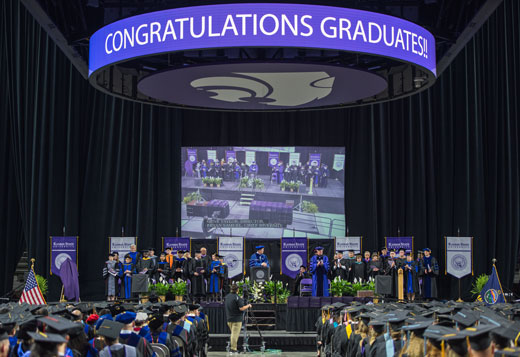 Kansas State University's student-centered approach to higher education is consistently influencing employment rates and career success for recent graduates.
Kansas State University's student-centered approach to higher education is consistently influencing employment rates and career success for recent graduates.
"Thanks to support from the entire university community, the class of 2018-2019 found continued success in pursuing a variety of job and educational opportunities," said Kerri Day Keller, director of the university's Career Center. "This year's bachelor's degree graduates set another placement record of 97% securing employment or furthering their education within six months of graduation."
Keller's statistics are from the university's recently released post-graduation report, an annual report that shows a 1% increase in employment and continuing education rates. With an 81% response rate, the increase has become a reoccurring trend. According to the 2019 report, 96% of 2017-2018 bachelor's degree graduates were employed or pursuing further education six months after they graduated. That number was 95% for 2016-2017 graduates and 94% for 2015-2016 graduates according to the respective reporting years.
"Kansas State University faculty and staff are deeply committed to students' personal and academic success and it shows," said Thomas Lane, vice president for student life and dean of students. "This student-centered approach helps K-Staters become highly desirable in the job market and get an immediate return on their investment."
The 2018-2019 bachelor's degree graduates reported a higher median salary at more than $48,000 six months after graduation. Graduates across all degrees were employed by more than 3,400 different organizations and enrolled in more than 740 different educational programs.
"Compared to one year ago, we are pleased to see about a 7% increase to the overall salary average for new bachelor's degree recipients," Keller said.
In addition, Kansas remains the top state for employment of K-State graduates at 56%, and 76% of bachelor's degree graduates were employed in the five-state area of Kansas, Colorado, Missouri, Nebraska and Oklahoma. The span of K-State graduates is wide too. New graduates are employed in 49 states and more than 30 countries.
According to Keller, the variety of opportunities available to K-State students boosts their career readiness.
"Beyond the classroom, K-State students gain marketable skills and experience through a wealth of opportunities such as internships, education abroad, undergraduate research, campus employment, student organizations, leadership opportunities and more," Keller said. "We are fortunate to have a university wide learning environment that supports the career readiness and employability of our students."
The university offers a variety of student success programs from freshman year to graduation, such as K-State First, a comprehensive program to help new students adjust to campus life, and one of the largest career fairs in the Big 12. In addition, the university has an 18-to-one student-to-teacher ratio and about 92% of classes have fewer than 53 students.
K-Staters Sylvia and Roy Robinson recognized as Volunteers of the Year after a lifetime of service
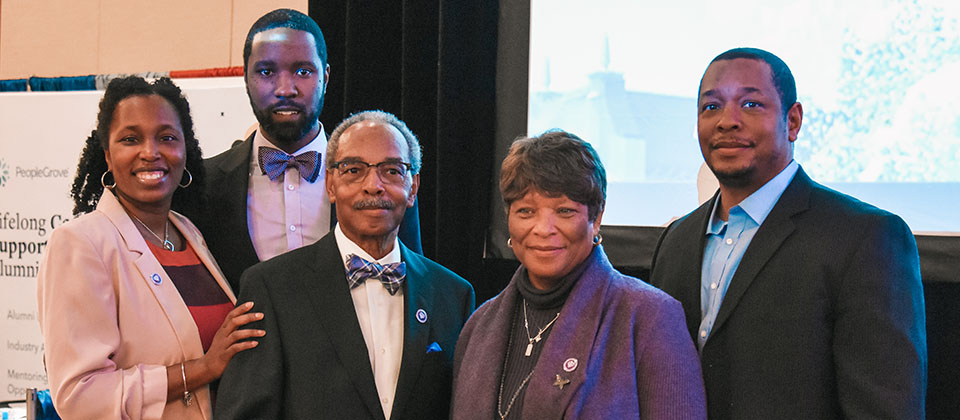 In recognition of their K-State legacy of service, Sylvia and Roy Robinson were honored as the 2020 Volunteers of the Year by the Council for Advancement and Support of Education, or CASE, District VI at the annual conference in Kansas City in January.
In recognition of their K-State legacy of service, Sylvia and Roy Robinson were honored as the 2020 Volunteers of the Year by the Council for Advancement and Support of Education, or CASE, District VI at the annual conference in Kansas City in January.
The Robinsons were students at K-State during a time of social unrest, both on campus and nationally. Roy earned a degree in milling science and management in 1970. Sylvia earned a degree in elementary education in 1971. Both Sylvia and Roy were founding members of the Black Student Union.
Roy was a member of the K-State ROTC program, held a long career in milling and retired as vice president of ADM in Overland Park, Kansas. In 2012, he was recognized with the Outstanding Alumni Award from the Department of Grain Science and Industry.
Sylvia was a charter member of Delta Sigma Theta and a K-State cheerleader. She also has served on the Kansas Board of Regents, board of the Kauffman Fund for Greater Kansas City and the Kansas City, Kansas, Board of Education.
The Robinsons were both recognized as K-State Alumni Fellows in 2005 and also endowed the Robinson Family Multicultural Leadership Awards program with the K-State Alumni Association in 2017. Each year, the awards program recognizes four outstanding graduating students who are leaving a legacy of enhancing multicultural engagement at K-State through their leadership.
"Roy and Sylvia Robinson put the knowledge and experiences they received at K-State to good use," said Amy Button Renz, president and CEO of the K-State Alumni Association. "Through their involvement and generosity K-State is a better place. We are truly honored to count them among our alumni and thrilled for them to receive this prestigious award."
The Robinsons expressed gratitude that K-State provided opportunities for ordinary students to step up and be leaders, and to advocate for changes that would make campus and society a better place, with equality for all.
"For me, as a first-generation college student, going to K-State and being successful, it was a life-changing moment," Sylvia said. "That degree alone began to open doors to me. It changed my life trajectory. It empowers you in ways you didn't even know you could be."
"My time at KSU changed my life," Roy added. "It allowed me to move forward in life — to have a good life and to help others. You have to be at the table to make a difference."
K-State Faculty Highlights
Heather Bailey recognized as Professor of the Week
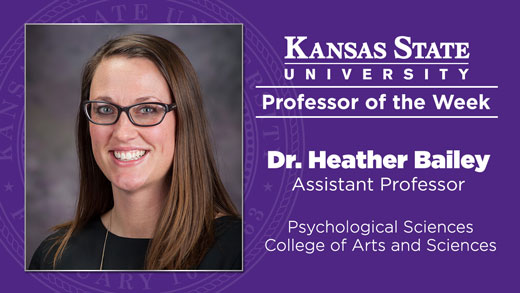 Heather Bailey, assistant professor of psychological sciences, was recognized as Professor of the Week at the Feb. 11 men's home basketball game.
Heather Bailey, assistant professor of psychological sciences, was recognized as Professor of the Week at the Feb. 11 men's home basketball game.
Bailey joined the psychological sciences department in 2013. She teaches a variety of graduate and undergraduate courses in the department, including Cognitive Psychology, Psychology of Aging and Controversial Issues in Psychology. She also serves as the faculty advisor for Psi Chi, the international honor society in psychology, where she mentors outstanding psychology majors on their professional development and preparation for graduate school.
Bailey's research focuses on the strategies people use to learn and remember new information and how these strategies change with age. Her work is supported by a grant from the National Institutes of Health, and she enjoys mentoring undergraduate and graduate students in the laboratory.
Bailey applies the memory research she conducts in the laboratory to help improve student learning in the classroom, and she tries to instill the same passion for learning and memory in her students. Her teaching efforts have been recognized by various awards at K-State including the Stamey Award for Undergraduate Teaching in 2017, the Presidential Award for Teaching Excellence in 2018, and she shared some of her teaching strategies at the 2019 SPOTLIGHT K-State event. Bailey is constantly seeking to learn new teaching strategies and attributes a great deal of her teaching success to the wide variety of opportunities offered at K-State to help junior faculty in their teaching efforts as well as an amazing group of mentors across campus.
The Professor of the Week recognition is coordinated by Faculty Senate, the President's office, K-State Athletics and the Division of Communications and Marketing. Recipients are faculty members selected by Faculty Senate caucuses. Those selected are provided tickets to a men's home basketball game of their choosing and are recognized during halftime. This is just a small token of appreciation for those who teach at K-State.
National Agricultural Biosecurity Center awarded USDA grants for agricultural disease preparedness
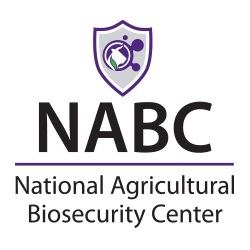 The National Agricultural Biosecurity Center, or NABC, at the Biosecurity Research Institute at Kansas State University, received two grants from the United States Department of Agriculture's Animal and Plant Health Inspection Service. These grants, which are funded by the 2018 Farm Bill, will be used to fund two projects at K-State pertaining to agricultural disease preparedness and response.
The National Agricultural Biosecurity Center, or NABC, at the Biosecurity Research Institute at Kansas State University, received two grants from the United States Department of Agriculture's Animal and Plant Health Inspection Service. These grants, which are funded by the 2018 Farm Bill, will be used to fund two projects at K-State pertaining to agricultural disease preparedness and response.
These projects endeavor to strengthen the response to limiting the short- and long-term impacts of a high-consequence disease event in Kansas and the surrounding region. They will facilitate greater cooperation between government, industry and academic officials in planning and preparing before an event takes place and in responding effectively if an event occurs.
The first project, "Secure Food Supply Permitting Exercise for the High Plains Region," will test the capability of Kansas, Colorado, Oklahoma and Texas to issue permits for interstate and intrastate livestock movement during a disease outbreak to facilitate business continuity. Each state is working to implement secure food supply plans designed to increase biosecurity and allow for continuity of business across multiple sectors of the livestock industry in the face of a high-consequence disease outbreak like African Swine Fever or foot-and-mouth disease.
The second project, "Tabletop Exercises for Local Jurisdictions," is a joint effort between the NABC, the Kansas Department of Agriculture and the Kansas Division of Emergency Management to create a series of regional exercises. These exercises will allow counties to test their current response plans as they relate to controlling a high-consequence livestock disease outbreak.
"The NABC is pleased to assist the USDA in preparing for potential high-consequence animal disease outbreaks," said Marty Vanier, D.V.M., director of the NABC. "The lessons learned in these exercises will help counties prepare and respond to disease outbreaks and will allow states to enhance continuity of business and community resilience."
These two projects build on the growing recognition of the NABC as a nationally prominent research center that enhances and promotes multidisciplinary collaboration amongst government, industry and academic partners. The USDA awards for these proposals assist in strengthening state and county collaborations as well as expanding partnerships with a coalition of neighboring states. These awards demonstrate the productivity, practicality and innovation the NABC helps deliver when pursuing the university's land-grant mission and global foods systems initiative.
"It is great having NABC staff located in Pat Roberts Hall," said Stephen Higgs, director of the Biosecurity Research Institute. "They provide expertise and a network of relationships that are both novel and complementary to the BRI's research, education and training related to biosecurity and the global food and health mission."
The grants are a part of a total of $10.2 million awarded by the USDA to institutions and agencies to support disease prevention and emergency response training and exercise projects as well as targeted projects to enhance laboratory diagnostic capability.
K-State Student News
K-State livestock judging team nabs national runner-up
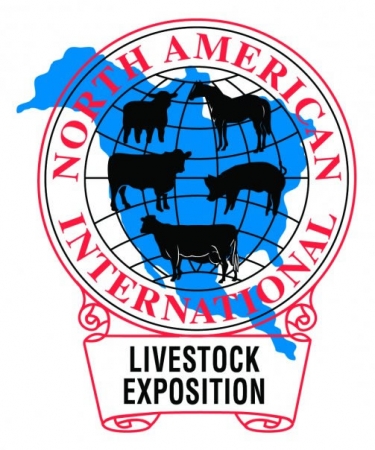 The Kansas State University livestock judging team maintained its lofty status as one of the best in the United States recently, finishing as the national runner-up at the North American International Livestock Exposition in Louisville, Kentucky.
The Kansas State University livestock judging team maintained its lofty status as one of the best in the United States recently, finishing as the national runner-up at the North American International Livestock Exposition in Louisville, Kentucky.
The contest, in its 114th year, is recognized as the top competition in the country for collegiate livestock judging teams. K-State has had a team since 1903, during which time the university has won 13 national titles, including a record-setting five in a row from 1994 to 1998.
“This team will go down as one of the most consistent and successful squads in recent memory,” said Chris Mullinix, instructor of animal sciences and the team’s coach. “These students take incredible pride in representing K-State and have worked tirelessly to get to this level.”
In addition to finishing second at the national contest, K-State completed the 2019 season with wins at the American Royal in Kansas City, and the Houston Livestock Show; and a runner-up finish at the National Western Stock Show in Denver.
“K-State was the nation’s only team to be honored in the top two spots at all four of the nation's largest collegiate events,” Mullinix said. “As a coach, I’m so proud of their commitment to be the very best. Most importantly, these are young people that will take their K-State education and the skills developed through livestock judging and make a major impact in this industry. I couldn’t be more proud.”
Collegiate livestock judging consists of 12 classes covering beef cattle, swine, sheep and goats. Students are asked to evaluate phenotype, pedigree and genetic information of breeding and market animals, then give oral reasons on their rankings.
At the national contest, Oklahoma State University was the top team in the collegiate division, followed by K-State, which also placed second as a team in oral reasons and swine, and third as a team in the beef category.
Among individuals, Samuel Lawrence (Avilla, Indiana) placed first nationally in the swine judging category; Adrian Austin (Mt. Vernon, Illinois) placed third in beef and fourth in oral reasons; Justin Nofzinger (Wauseon, Ohio) placed fourth in beef; Cade Hibdon (Princeton, Kansas) placed fifth in swine; and Cooper Carlisle (Ropesville, Texas) was seventh in sheep and 10th in oral reasons.
Austin and fellow team members Kaylee Farmer (Nevada, Missouri), Kaci Foraker (Burrton, Kansas), Keayla Harr (Jeromesville, Ohio) and Cole Liggett (Dennison, Ohio) were named All Americans for 2019.
“The All American team recognizes 12 students based on academic success, industry involvement, campus leadership, community service and success in the judging competition,” Mullinix said. “K-State’s five All Americans were more than any institution. In the past decade, K-State has now had 26 young people named All Americans, which is also more than any other member institution.”
“In my opinion, there is no activity that better complements a student’s education than participating on a collegiate judging team,” Mullinix said. “Perhaps today more than ever, young people are not engaging in activities that develop decision making, critical thinking and communication skills. Livestock judging does all of that in a competitive environment while promoting time management and working in a team setting.”
He adds: “When you pair those skills with a first-class animal science degree, it’s obvious why these students are so marketable and make advancements in their careers so quickly. Additionally, the livestock judging team is such a visible program with competitions held at the nation’s most historic stock shows. It creates an incredible following amongst alumni and potential students. Many of our students first heard of K-State because of the livestock judging team.”
More information about K-State’s livestock judging team is available online.